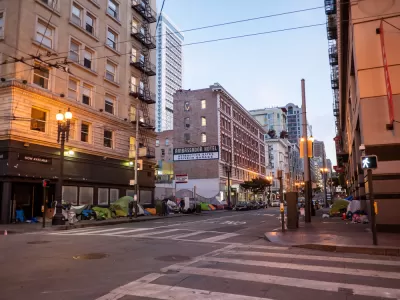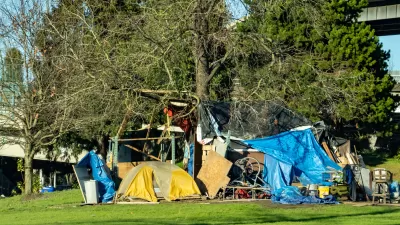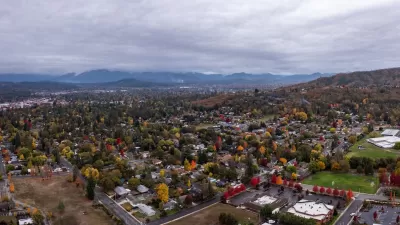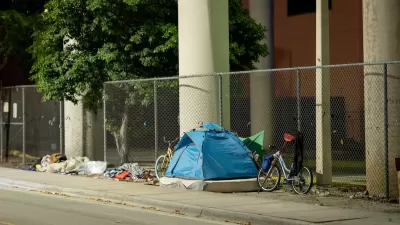Measure O may be one of the first ballot measures of its kind to empower residents to take legal action against a city for illegal encampments on city property. The Sacramento City Council voted 7-2 on August 9 to place the ordinance before voters.

Lawsuits against cities over sidewalk encampments are becoming more common, report Lauren Hepler and Raheem Hosseini for the San Francisco Chronicle on September 23.
In the Tenderloin, it was UC Hastings College of the Law that sued the city of San Francisco over “abandoning” the neighborhood to tents and open drug dealing. In Venice Beach, a couple with two kids filed suit against Los Angeles over the tent city outside their front door. From Phoenix to Portland, Ore., other cases brought by residents fed up with what they see as the ill effects of homeless encampments are also winding through the courts.
Now, a Sacramento city ballot measure will ask voters to go a step farther: Measure O, officially called the “Emergency Shelter and Enforcement Act of 2022 [pdf],” would create a new public nuisance process for private citizens to take legal action against the city over encampments.
Measure O, aka the Homeless Persons Shelter and Encampment Measure, is a legislatively referred ballot measure that will appear with two other measures for the City of Sacramento November 8 election. It is a yes or no question appearing on the bottom of page 1 of the adopted city council resolution [pdf] on August 9. Italics added:
“Shall the measure entitled The City of Sacramento Emergency Shelter and Enforcement Act of 2022 – which requires identification of a minimum number of emergency shelter spaces based on the estimated number of homeless persons; conditions enforcement of the city’s unlawful camping ordinance on shelter space availability; prohibits encampments; allows residents to bring action against the city for unlawful camping or storage on city property; and limits the city’s annual general fund budget obligation to $5,000,000 – be adopted?”
Before legal action could be initiated by residents, the city must first “add 605 new emergency shelter spaces — whether outdoor or indoor, congregate or individual,” add Hepler and Hosseini.
Martin v. Boise
“Some unhoused residents and their advocates see the effort as an example of cities seeking new ways around a landmark court case, Martin v. Boise, which held that it violates the U.S. Constitution’s ban on cruel and unusual punishment to prohibit people from sleeping outside if there is no alternative,” add Hepler and Hosseini. [See 6 posts tagged Martin v. City of Boise.]
The landmark case, decided in September 2018 by the Ninth Court of Appeals in San Francisco, was the basis of a lawsuit brought by Sacramento homeless advocates against the Sacramento measure. “A judge on [Aug. 25] ruled the city of Sacramento can put an anti-camping ballot measure before voters in November, but said the court may intervene after the election," reported Kristin Lam for Capital Public Radio on August 25.
[Sacramento County Superior Court Judge Shelleyanne] Chang ruled that advocates failed to show the measure is invalid, but said the measure can be legally challenged if voters pass it. She added it is unclear if the Martin ruling applies to the measure and whether the measure would violate the case.
The ruling came two days after Sacramento city and county government officials passed ordinances banning encampments on sidewalks, along the American River Parkway or at places deemed critical infrastructure.
Bounty hunting?
One of the most interesting aspects of the lengthy source article was the comparison of Measure O to 'bounty hunting laws' such as the Texas Heartbeat Act that empowered residents to sue abortion providers and a new California gun safety law that is patterned on it.
Related:
- Los Angeles Tightens Restrictions on Encampments, August 9, 2022
- Judge Bars Sacramento Encampment Sweeps, August 7, 2022
- L.A. Shifts Homeless Policy to Clear Street Encampments, November 22, 2021
- Supreme Court Refuses Landmark Homelessness Case, December 16, 2019
FULL STORY: California’s homelessness crisis hits new flash point: Private residents suing cities over encampments

Alabama: Trump Terminates Settlements for Black Communities Harmed By Raw Sewage
Trump deemed the landmark civil rights agreement “illegal DEI and environmental justice policy.”

Study: Maui’s Plan to Convert Vacation Rentals to Long-Term Housing Could Cause Nearly $1 Billion Economic Loss
The plan would reduce visitor accommodation by 25% resulting in 1,900 jobs lost.

Planetizen Federal Action Tracker
A weekly monitor of how Trump’s orders and actions are impacting planners and planning in America.

Wind Energy on the Rise Despite Federal Policy Reversal
The Trump administration is revoking federal support for renewable energy, but demand for new projects continues unabated.

Passengers Flock to Caltrain After Electrification
The new electric trains are running faster and more reliably, leading to strong ridership growth on the Bay Area rail system.

Texas Churches Rally Behind ‘Yes in God’s Back Yard’ Legislation
Religious leaders want the state to reduce zoning regulations to streamline leasing church-owned land to housing developers.
Urban Design for Planners 1: Software Tools
This six-course series explores essential urban design concepts using open source software and equips planners with the tools they need to participate fully in the urban design process.
Planning for Universal Design
Learn the tools for implementing Universal Design in planning regulations.
Caltrans
Smith Gee Studio
Institute for Housing and Urban Development Studies (IHS)
City of Grandview
Harvard GSD Executive Education
Toledo-Lucas County Plan Commissions
Salt Lake City
NYU Wagner Graduate School of Public Service





























